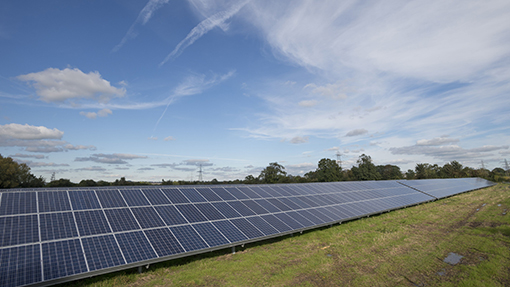Solar panel-filled farms could lose CAP payments

Farmers will lose their right to claim subsidies for fields filled with solar panels under plans to ensure more farmland is dedicated to growing food crops.
Defra said the move will help rural communities who do not want their countryside “blighted by solar farms”.
The change, which will come into force from January, will mean farmers who choose to use their fields for solar panels will not be eligible for any CAP farm subsidy payments for that land.
Read also: Ground-mounted solar farms face uncertainty
Defra secretary Liz Truss said large-scale solar farms were a “blight on the landscape” – and that land would be better used to grow crops for food.
Britain has some of the best farmland in the world and ministers want to see it dedicated to agriculture to boost the country’s food and farming industry, which is worth £97bn to the economy.
“English farmland is some of the best in the world and I want to see it dedicated to growing quality food and crops,” said Ms Truss.
“I do not want to see its productive potential wasted and its appearance blighted by solar farms. Farming is what our farms are for and it is what keeps our landscape beautiful.
“I am committed to food production in this country and it makes my heart sink to see row upon row of solar panels where once there was a field of wheat or grassland for livestock to graze.
“I am committed to food production in this country and it makes my heart sink to see row upon row of solar panels where once there was a field of wheat or grassland for livestock to graze.”
Defra secretary Liz Truss
“That is why I am scrapping farming subsidies for solar fields. Solar panels are best placed on the 250,000ha of south-facing commercial rooftops where they will not compromise the success of our agricultural industry.”
Taxpayers will also save £2m a year and farmers will lose £100/acre that will not be available for these subsidies from Defra through the CAP.
See also: Read the latest news on CAP reform here
The reform follows other recent government action which reduces the attractiveness of solar farms on agricultural land, including the removal of support through Renewables Obligation Certificates (Rocs).
Rocs are tradeable green certificates issued to operators of accredited renewable generating stations for the eligible renewable electricity they generate.
From April 2015, 5MW-plus solar installations (about 14ha in land area) will have to bid for support under a market regime known as contracts for difference, rather than receiving support through Rocs.
Department for Communities and Local Government planning guidance favours brownfield sites over the use of agricultural land for large scale ground–mounted solar arrays and says that where greenfield sites are used, poorer quality land should be favoured above high-quality land.
The changes the government is making are expected to slow down the growth of solar farms in the countryside in England, especially in the South. There are 250 already installed, with the biggest covering as much as 100ha.
Under previous plans, the number of fields dedicated to solar farms was set to increase rapidly, with more than 1,000 ground-based solar farms expected by the end of the decade across the UK.
The government expects these changes to help stop this expansion, as it will now become less financially attractive for farmers to install the solar panels.
The decision is part of a drive by environment ministers to ensure that the new CAP delivers maximum benefits for the English food and farming industry, as well as providing greater benefits for rural communities, the environment and wildlife.
